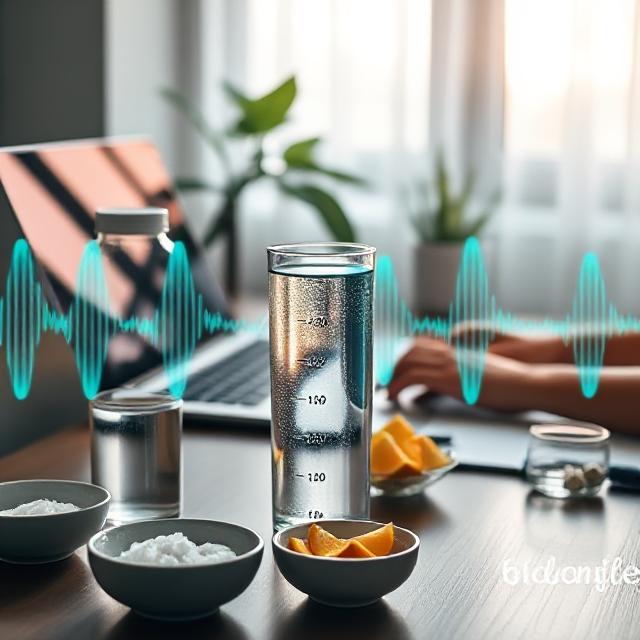
Table of Contents
The Role of Hydration in Sustained Flow States
TL;DR
Even mild dehydration can decrease your focus, reaction time, and memory—all of which are essential for entering and sustaining flow states. Water isn’t just fuel for your body. It’s a neurochemical lubricant, ensuring that your brain’s electrical signals, neurotransmitter function, and nutrient delivery all run smoothly. To go deep, stay sharp, and remain immersed, hydration is non-negotiable.
I. Why Hydration Matters for Cognitive Performance
Your brain is about 75% water. Unlike muscles or fat, the brain doesn’t store water well—it depends on constant fluid replenishment.
Hydration directly impacts:
- Neurotransmitter synthesis (dopamine, acetylcholine, etc.)
- Cerebral blood flow
- Synaptic firing speed
- Thermal regulation (critical for long deep work sessions)
- Mood and fatigue levels
Even 1–2% fluid loss can impair attention, working memory, and executive function—all vital ingredients in the flow state recipe.
II. What Happens to Your Brain When You’re Dehydrated
Dehydration disrupts the delicate electrochemical balance of your brain. Here’s what unfolds:
| Effect | Impact on Flow |
|---|---|
| Reduced cerebral blood flow | Less oxygen/glucose delivery = slower thought |
| Thicker blood (higher viscosity) | Impaired energy delivery and mental fatigue |
| Shrinking of brain tissue volume | Brain fog, poor short-term memory |
| Increased cortisol | Heightened stress = harder to reach relaxed focus |
| Disrupted thermoregulation | Overheating → loss of endurance in focus |
In short, your brain becomes noisy, tired, and impatient—the opposite of what’s needed for flow.
III. Brainwaves and Hydration: A Quiet Regulator
Emerging research suggests that hydration affects brainwave amplitude and coherence. In states of dehydration:
- Alpha waves drop, reducing calm alertness
- Theta wave access becomes chaotic and inconsistent
- High beta (stress) becomes more dominant
These shifts pull you out of flow and into agitation or drowsiness. Proper hydration can preserve the balance between calm attention and energized focus.
IV. The Ideal Hydration Strategy for Flow
Let’s turn theory into practice. Here’s how to hydrate for deep, focused work:
1. Start Your Day Replenished
You lose 0.5–1L of water overnight through breath and sweat. Begin each day with:
- 500–750 ml of filtered water
- A pinch of unrefined salt (for electrolytes)
- Optional: squeeze of lemon for potassium and trace minerals
This primes your neurons and blood volume before coffee or supplements.
2. Use a “Sip Strategy,” Not Chugging
The brain responds better to steady hydration, not bursts. Use this rhythm:
- 150–250 ml every 30–45 minutes during deep work
- Avoid drinking large amounts at once (can dilute electrolytes)
Pro tip: Keep a water bottle with time markers or alerts to build habit.
3. Balance Electrolytes for Neural Efficiency
Water without electrolytes can cause brain fog due to dilution. Add:
- Sodium (sea salt or electrolyte mix)
- Potassium (coconut water, lemon, or potassium salt)
- Magnesium (calm nerves, reduce brain stress)
Low magnesium alone can hinder GABA production and increase inner noise, making flow harder.
V. Caffeine, Dehydration, and Focus
Caffeine is both a focus booster and a mild diuretic. In moderate doses, it helps:
- Increase dopamine
- Enhance reaction time
- Promote alpha+beta wave blend
But if you’re not hydrated, caffeine:
- Causes faster water/electrolyte loss
- Overstimulates your adrenal axis
- Leads to rebound crashes or fog
Hack: For each cup of coffee or tea, add an equal volume of water plus a small pinch of salt.
VI. Signs You’re Losing Flow Due to Dehydration
Not sure if hydration is the issue? Look for:
- Subtle tension behind the eyes
- Diminished clarity or slowing thoughts
- Irritability or emotional edginess
- Yawning or mind-wandering
- Loss of rhythm in typing or task flow
- Dry mouth or sudden hunger pangs
If these arise during deep work, take a 2-minute hydration pause and recalibrate.
VII. Supplement Stack for Hydration-Enhanced Flow
| Supplement | Function |
|---|---|
| Electrolyte Mix | Balances sodium/potassium/magnesium |
| Magnesium Glycinate | Calms nerves, supports GABA |
| Taurine | Enhances cellular hydration and focus |
| L-Theanine | Promotes alpha waves, reduces stress |
| Creatine | Supports brain energy and fluid balance |
Stack these in the morning or pre-flow session to create a neurochemical terrain ideal for immersion.
VIII. Hydration Rituals to Anchor Your Flow
Treat hydration as a pre-flow ritual:
- Fill your water bottle before starting
- Use herbal teas with light electrolytes (e.g. hibiscus + salt)
- Anchor a specific mug or cup to flow sessions only
- Drink a small glass of cool water before pressing “Start”
Over time, this builds conditioning: water = time to go deep.
Final Thoughts: Water is the Silent Key to Mental Immersion
You can have the right playlist, perfect lighting, and powerful nootropics—but if your brain is thirsty, you’ll struggle to enter or sustain flow.
Hydration doesn’t just support health. It supports neural elegance—the seamless, energized, rhythm of a brain fully immersed in a task.
So the next time you find yourself drifting, foggy, or agitated during a deep work session, don’t reach for a productivity app.
Reach for water.
